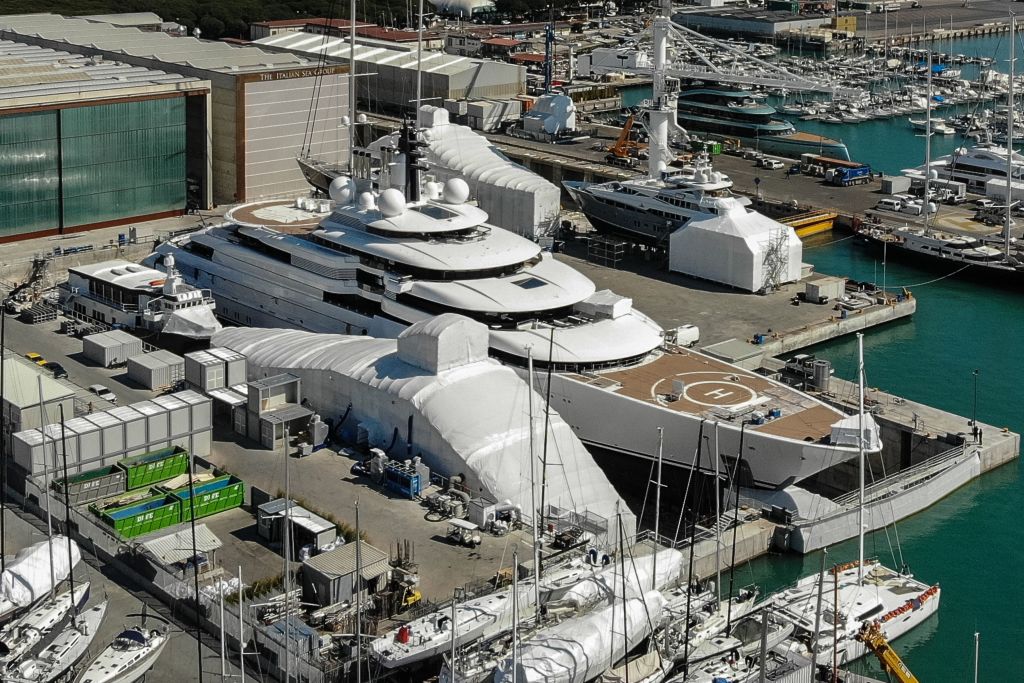Navalny group presents evidence Putin owns mysterious $700 million mega-yacht Scheherazade

A free daily email with the biggest news stories of the day – and the best features from TheWeek.com
You are now subscribed
Your newsletter sign-up was successful
France, Italy, and Spain have seized at least eight yachts linked to Russian oligarchs hit with sanctions after Russia invaded Ukraine on Feb. 24. Other sanctioned Russians have moved their mega-yachts to the Maldives, Seychelles, Dubai, Turkey, and other areas out of the reach of U.S., British, and European Union oligarch asset hunters.
Graceful, a $140 million yacht believed to be owned by Russian President Vladimir Putin, got a head start, sailing from Germany to the coast of Kaliningrad, Russia, in mid-February, about two weeks before Russia's invasion. But the $700 million, 459-foot superyacht Scheherazade, rumored to be "Putin's yacht," has been docked in an Italian port, Marina di Carrara, since September.

"In the rarefied world of the biggest superyachts," The New York Times reported earlier in March, "the Scheherazade is alone in that no likely owner has been publicly identified." Even in "the hyper-confidential world of superyachting," the Times adds, "there is an unusual degree of secrecy surrounding this vessel."
The Week
Escape your echo chamber. Get the facts behind the news, plus analysis from multiple perspectives.

Sign up for The Week's Free Newsletters
From our morning news briefing to a weekly Good News Newsletter, get the best of The Week delivered directly to your inbox.
From our morning news briefing to a weekly Good News Newsletter, get the best of The Week delivered directly to your inbox.
The Scheherazade's British captain, Guy Bennett-Pearce, told the Times that while he is not allowed to disclose who owns the ship, it is not Putin. "I have never seen him," he said. "I have never met him." He also said Italian finance investigators had recently boarded the ship looking for certification documents.
Jailed dissident Alexei Navalny's Anti-Corruption Foundation said Monday that aside from Bennett-Pearce, the rest of the Scheherazade's crew is not just Russian, but also work for the FSO, or Federal Protective Service, Russia's equivalent of the U.S. Secret Service. Navalny's team ran through how it linked the crew to the FSO in a Russian-language video and in English on Twitter.
Putin officially earns a $136,000 salary and owns a modest apartment, three Soviet-era cars, and a small camping trailer, Radio Free Europe reports, but Navalny's group and other anti-corruption politicians — some subsequently killed or poisoned — have linked Putin to a vast spread of mansions, jets, yachts, and other luxury assets. "Putin never keeps assets under his own name," though, Navalny investigator Maria Pevchikh tweeted. "So you need to look not at the ownership structure but rather at who manages and pays for it."
"FSO is a militarized state agency responsible for the security and wellbeing of Vladimir Putin personally," Pevchikh wrote. But along with bodyguard duties, "FSO officers are also responsible for all Putin's official residences. ... They are literally running Putin's life." And his yacht, apparently, unless finance police can trace the Scheherazade's ownership back to him.
A free daily email with the biggest news stories of the day – and the best features from TheWeek.com
Peter has worked as a news and culture writer and editor at The Week since the site's launch in 2008. He covers politics, world affairs, religion and cultural currents. His journalism career began as a copy editor at a financial newswire and has included editorial positions at The New York Times Magazine, Facts on File, and Oregon State University.
-
 What to know before filing your own taxes for the first time
What to know before filing your own taxes for the first timethe explainer Tackle this financial milestone with confidence
-
 The biggest box office flops of the 21st century
The biggest box office flops of the 21st centuryin depth Unnecessary remakes and turgid, expensive CGI-fests highlight this list of these most notorious box-office losers
-
 The 10 most infamous abductions in modern history
The 10 most infamous abductions in modern historyin depth The taking of Savannah Guthrie’s mother, Nancy, is the latest in a long string of high-profile kidnappings
-
 What will bring Vladimir Putin to the negotiating table?
What will bring Vladimir Putin to the negotiating table?Today’s Big Question With diplomatic efforts stalling, the US and EU turn again to sanctions as Russian drone strikes on Poland risk dramatically escalating conflict
-
 The mission to demine Ukraine
The mission to demine UkraineThe Explainer An estimated quarter of the nation – an area the size of England – is contaminated with landmines and unexploded shells from the war
-
 The secret lives of Russian saboteurs
The secret lives of Russian saboteursUnder The Radar Moscow is recruiting criminal agents to sow chaos and fear among its enemies
-
 Is the 'coalition of the willing' going to work?
Is the 'coalition of the willing' going to work?Today's Big Question PM's proposal for UK/French-led peacekeeping force in Ukraine provokes 'hostility' in Moscow and 'derision' in Washington
-
 Ukraine: where do Trump's loyalties really lie?
Ukraine: where do Trump's loyalties really lie?Today's Big Question 'Extraordinary pivot' by US president – driven by personal, ideological and strategic factors – has 'upended decades of hawkish foreign policy toward Russia'
-
 What will Trump-Putin Ukraine peace deal look like?
What will Trump-Putin Ukraine peace deal look like?Today's Big Question US president 'blindsides' European and UK leaders, indicating Ukraine must concede seized territory and forget about Nato membership
-
 Ukraine's disappearing army
Ukraine's disappearing armyUnder the Radar Every day unwilling conscripts and disillusioned veterans are fleeing the front
-
 Cuba's mercenaries fighting against Ukraine
Cuba's mercenaries fighting against UkraineThe Explainer Young men lured by high salaries and Russian citizenship to enlist for a year are now trapped on front lines of war indefinitely
